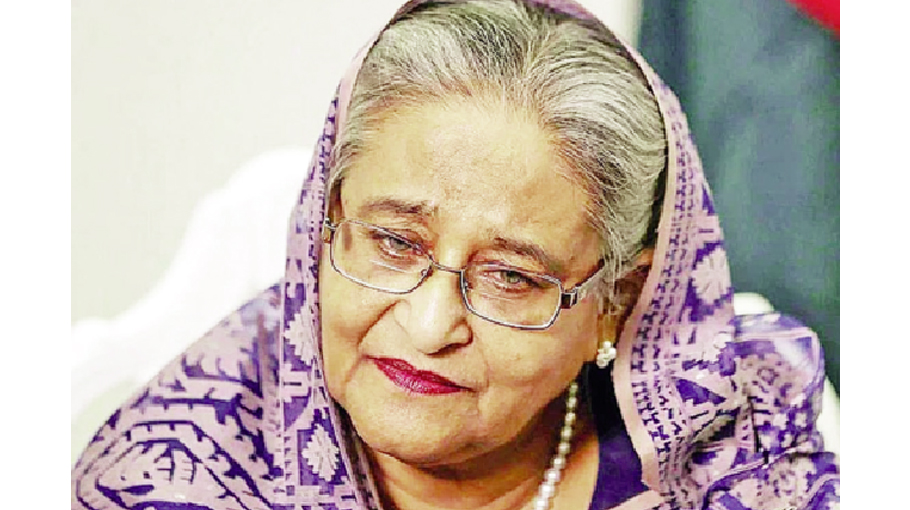Arrest warrant issued for Hasina
ICT also issues the warrant for 45 others including Joy, Quader

A Dhaka court on Thursday issued warrant of arrest against former prime minister Sheikh Hasina, who fled to India on August 5 after she had been ousted following a mass upsurge in Bangladesh.
The International Crimes Tribunal (ICT), a domestic judicial mechanism set up in 2009 during Sheikh Hasina-led regime to investigate and prosecute suspects for genocide and crimes against humanity; issued the arrest warrant.
Sheikh Hasina is wanted by the tribunal for her alleged involvement in crimes against humanity that took place during the July-August mass uprising, in which hundreds of people were killed.
Arrest warrants have also been issued for 45 other people. Among them, Sheikh Hasina’s son Sajeeb Wazed Joy, Awami League General Secretary and former road transport and bridges minister Obaidul Quader, former foreign minister Hasan Mahmud, former law minister Anisul Huq, former liberation war affairs minister AKM Mozammel Haque, former home affairs minister Asaduzzaman Khan Kamal and former state minister for ICT Zunaid Ahmed Palak.
The three-judge tribunal, led by its Chairman Justice Md Golam Mortuza Majumdar, issued the arrest warrant for Hasina, allowing a plea of the prosecution.
“The tribunal issued the order, asking to arrest and subsequently produce Sheikh Hasina before the court by November 18,” said ICT Chief Prosecutor Advocate Mohammad Tajul Islam.
“Sheikh Hasina was at the helm of those who committed massacres, killings and crimes against humanity in July and August,” he added.
ICT Prosecutor BM Sultan Mahmud said that two petitions were submitted before the tribunal, the first for arrest warrant for Sheikh
Hasina and the second for 45 others.
Meanwhile, in his opening speech to the tribunal, ICT Chief Prosecutor Advocate Tajul Islam summarised the crimes against humanity during the Awami League’s rule, including the killing of 74 people during the BDR mutiny, the massacre at the Shapla Chattar on Hifazat e-Islam men, extra-judicial killings by the Rapid Action Battalion (RAB), and the July-August ‘massacre’.
Through the issuance of arrest warrant against Sheikh Hasina, the ICT has initiated trial procedures for genocide and crimes against humanity committed during the student-led mass movement that toppled Hasina-led Awami League regime and other crimes of the ousted regime.
The move against Sheikh Hasina aimed to expedite the trials for crimes against humanity and genocide committed during the July-August uprising by the ousted PM and her government.
Earlier, Advocate Tajul Islam said that the main accused in most of the genocide cases Hasina will be brought back to the country and tried before the tribunal.
The government on Monday constituted the three-member tribunal headed by Justice Md Golam Mostafa Majumder. The other members of the tribunal are—Justice Md Shafiul Alam Mahmud and Md Mohitul Haque Enam Chowdhury.
Justice Golam Mostafa Majumder and Justice Shafiul Alam Mahmud are among the 23 additional judges appointed to the High Court on October 8.
This followed the government’s decision last month to reform both the prosecution team and the investigation agency of the tribunal.
Earlier on September 5, senior lawyer of the Supreme Court Advocate Tajul Islam was appointed the Chief Prosecutor. Five other prosecutors are-- Advocate Md Mizanul Islam, Advocate Gazi Monwarul Hussain Tamim, BM Sultan Mahmud and Abdullah Al Noman and Md Saimum Reza Talukder.
Besides, a 10-member investigative team, headed by former Additional Deputy Inspector General (Additional-DIG) of Police Md Mazaharul Haque, was also formed to investigate the allegations submitted to the ICT.
More than 60 allegations of mass killing and crimes against humanity committed from July 5 to August 5 were submitted before the ICT investigation agency and prosecution team, targeting Sheikh Hasina and her party men.
Sheikh Hasina fled the country on August 5 in the wake of student-led mass upsurge. Later, Nobel laureate Professor Dr. Muhammad Yunus took over as the chief of the interim government.
A total of 1500 students and people embraced martyrdom by the members of law and order enforcement agencies and Awami League cadres during the 36-day long movement, making bloodiest period in the country’s history since the Bangladesh War of Liberation in 1971.
Over 500 people have been crippled when members of the law enforcement agencies and Awami League cadres opened fire on the agitating people. A total of 23,000 people were also injured at that time, many of them are also undergoing treatment at different health facilities.
77-year old Sheikh Hasina, who was in charge of Bangladesh for more than 20 years, is seen as an autocrat whose government ruthlessly clamped down on dissent. She has not been seen in public since fleeing the country. Her last official whereabouts is a military airbase near Delhi.
She was initially expected to stay in India for a short time, but reports say her attempts to seek asylum elsewhere have been unsuccessful so far.



